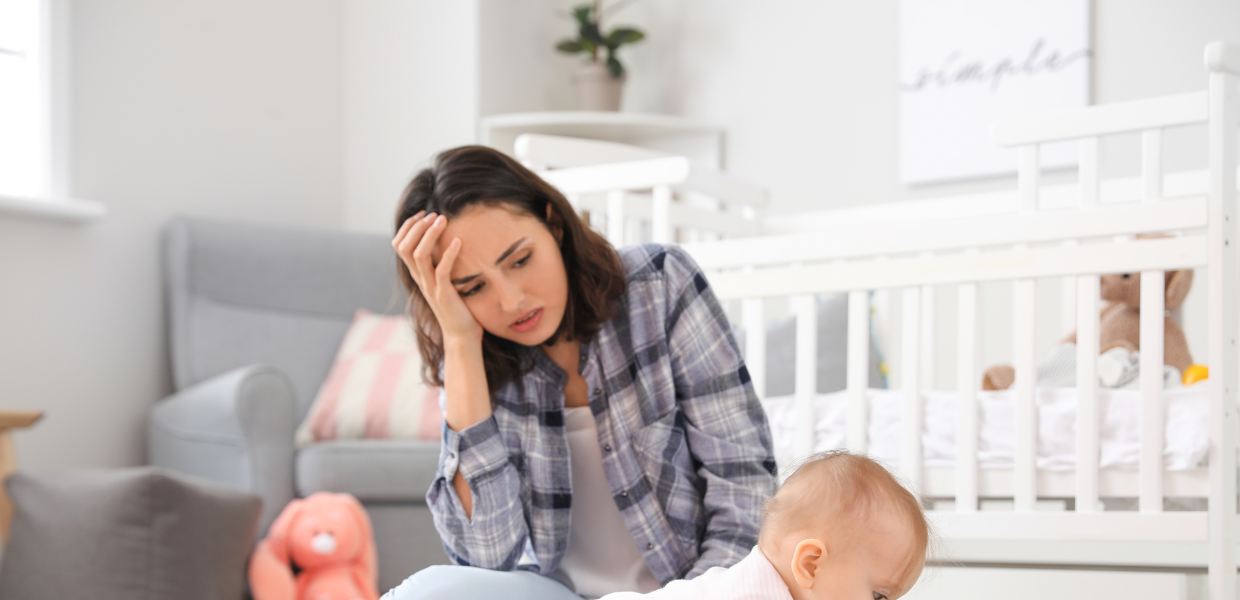With all the huge changes that pregnancy and having a newborn bring, it’s no wonder that this can have an impact on your mental health.
The important thing to remember is that you’re not alone and, whatever you’re feeling or going through, we are here to help.
This page outlines some of the most common problems experienced during pregnancy and the first year of your baby’s life – which is referred to as the perinatal period – and how we can support you though them.
You are not on your own
Almost half of new mums and dads (four in 10) say they have experienced significant stress, anxiety or depression during and after pregnancy. There’s absolutely nothing to ashamed about and it does not mean you’re a bad parent – we all need a bit of help sometimes.
Pregnancy can be a very stressful time and it is normal to feel mixed emotions during this time, particularly with the hormone changes that happen during pregnancy and after having a baby. If these symptoms carry on or are becoming worse, or you are worried at all, please discuss this with your Midwife / Health Visitor or GP.
You may be at increased risk if you have experienced previous mental health difficulties or if someone in your family has had mental health difficulties during pregnancy or after giving birth. You will be asked these questions when you first meet with your Midwife.
There are other factors that research has shown can also increase the risk of experiencing mental health issues, including:
- A traumatic birth
- Lack of support
- Relationship difficulties
- Financial concerns
Types of perinatal mental health issues
- Antenatal anxiety – including Obsessive Compulsive Disorder (OCD)
- Antenatal depression
- Postnatal anxiety and/ or depression
- Puerperal Psychosis – this is a rare condition affecting between one and two in 1000 women. This usually develops quite rapidly after birth and mainly requires hospital treatment in a Mother and Baby Unit
- Eating disorders
- Post Traumatic Stress Disorder (PTSD)
- Mother-infant relationship issues
- Fear of childbirth (tocophobia)
How you may be feeling
You may find that you feel or experience some of the following during pregnancy or in the first year after baby is born:
- Low mood/ feeling bleak or unhappy
- Poor concentration or lack of interest
- Feeling disengaged or worthless
- Tearful
- Anxious/ nervous energy
- Change in appetite
- Low sex drive
- Sleep difficulties
- Difficulty bonding with your baby
- Irritability/ anger
- Social withdrawal
- Obsessive thoughts or behaviour
- Suicidal thoughts
Help and support
If you are experiencing any of these conditions or feelings, please talk to your Midwife, Health Visitor or GP. We can help get the right support in place for you, your baby and your wider family.
This help isn’t only open to mums. Dads also experience low mood and anxiety and we’re here for you too.
Things you can do to boost your mental health
- Talk. It may sound simple, but talking to your partner, friends and family about how you’re feeling can make a big difference.
- Don’t put too much pressure on yourself. If people offer to help and support with household chores and tasks, let them help.
- Speak with your Midwife, Health Visitor, or GP
- Keep a diary of how you are feeling
- Attend local groups at Family Hubs and Children’s Centres
- Eat regularly and have a healthy, well-balanced diet
- Keep active and try to get out of the house. Balance this by ensuring you get some rest when you can.
- Practice relaxation techniques such as yoga and pilates
- Spend time interacting with your baby, laughing, playing, talking, singing. Your baby’s brain is developing every time you interact with them – even just smiling at them “grows” their brain.
- Remind yourself that these feelings won’t last forever
Contact us
Diana Princess of Wales Hospital
- Community Midwives Grimsby – 03033 305232
- Louth Midwives – 01507 600100 ext 1210
- NAVIGO Single Point of Access 01472 256256 (Option 3)
- Harrison House – 01472 252366
- Lincolnshire Single Point of Access (24 hrs) – 03031234000
- Louth ‘Steps to change’ – 01507 607383
Scunthorpe General Hospital
- Town Team Midwives Cottage Beck – 03033 303088 / 03033 302856
- Brigg / Barton Midwives – 03033 306860
- Isle Team – Crowle – 03033 304079
- Access Team Mental Health (24hrs) – 01724 382015
- ‘Talking shop’ – 01724 867297
- Great Oaks – 01724 382000
Goole District Hospital
- Goole Midwives – 03033 304079
- Emotional Wellbeing Service – 01482 335451
- Mental Health Response Team (24 hours) – 01482 301701 (option 1 to option 3)
Support is also available online:
- Every Mum Matters – www.everymummatters.com
- pandasfoundation.org.uk
- www.mind.org.uk
- NHS England
Review information
Date of Issue: April, 2021
Review Period: April, 2024
